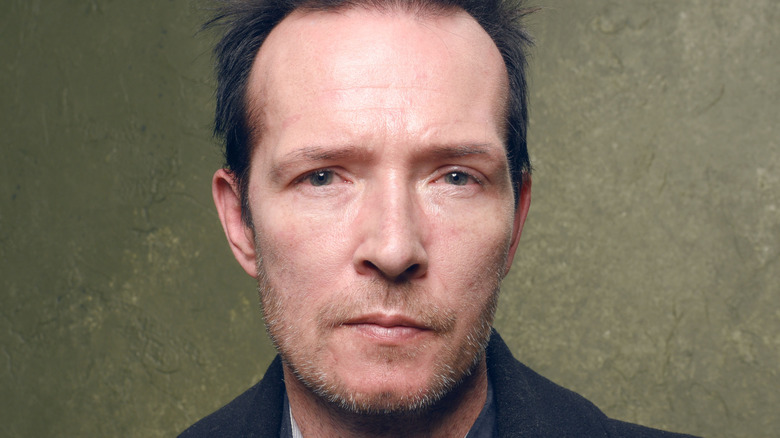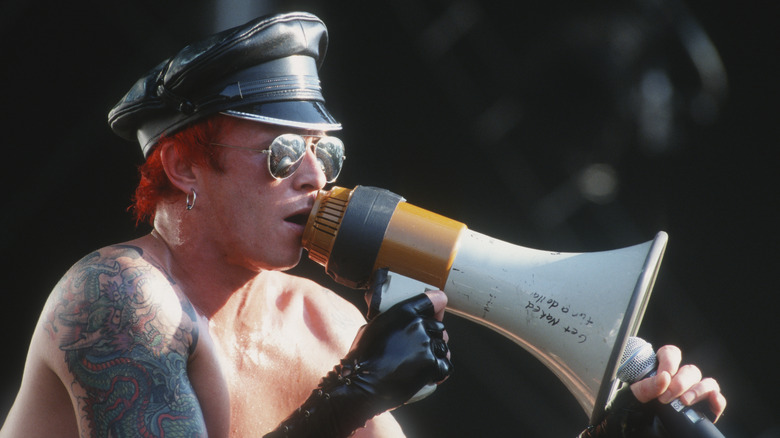Tragic Details Found In Scott Weiland's Autopsy Report
While the epicenter of the rock music world in the early 1990s was had its focus on the Pacific Northwest, one of the bands that would become among the decade's biggest — and most enduring — started their journey in the mid-1980s. According to Loudwire, the band was comprised of brothers Robert and Dean DeLeo on bass and guitar respectively, along with drummer Eric Kretz and vocalist Scott Weiland. They were known as Mighty Joe Young. But there was a problem, ahead of the release of their debut album, "Core," it was learned that the name Mighty Joe Young had been trademarked by a blues musician, so they had to make a change and became Stone Temple Pilots.
The band offered a contrast to the flannel-wearing contemporaries with frontman Weiland — a consummate showman who idolized David Bowie, according to Billboard — commanding the stage with slithery dance moves and even breaking out a megaphone to distort his vocals on songs like "Crackerman" and "Naked Sunday." Over the years the band became known for hits songs like "Plush," "Vasoline," and "Interstate Love Song," and like so many successful rock bands, that success came with a dark side.
Weiland's drug addiction was highly-publicized for years
After the release of the band's 1995 album "Tiny Music... Songs from the Vatican Gift Shop" Weiland's drug habits caught up to him, which according to Louder Sound had started when he was in his teens. Loudwire reported he was arrested for buying crack cocaine before the band was set to tour and sentenced to one year of probation. Unable to leave California, Weiland worked on a solo record. The other members of Stone Temple Pilots toured as a side-project called Talk Show.
In the early 2000s, the Stone Temple Pilots went on another hiatus that would last nearly a decade. Weiland was arrested again, this time following a bust for heroin and cocaine which landed him in rehab for six months (via Esquire). He would go on to front Velvet Revolver, a band also comprised of former Guns N' Roses members Slash, Duff McKagen, and Matt Sorum.
Weiland left Velvet Revolver in 2008, reunited with Stone Temple Pilots, and continued to put out solo efforts like 2011's holiday album "Most Wonderful Time of the Year," all the while dealing with his drug addiction and maintaining sobriety.
In May 2015, Weiland appeared at a rock festival in Columbus, Ohio with his solo project Scott Weiland and the Wildabouts. There his uncharacteristically low-energy performance and monotone answers in interviews left people wondering if the singer had suffered a relapse of the addiction that had plagued him for much of his life. Tragically, those suspicions would be confirmed before the end of the year.
Weiland is found dead on his tour bus
On December 3, 2015, Scott Weiland and the WIldabouts were on tour in Minnesota. According to Access, the band had been scheduled to play a show that day in Medina, Minnesota but it had been canceled a week earlier due to low ticket sales.
Per WCCO, the band's bus had been parked outside a hotel in Bloomington, Minnesota, a suburb just outside of Minneapolis. Transcripts of the 911 call placed by members of Weiland's band have one of them saying "I think he's dead. He's not moving. He's stiff." The dispatcher tried to give them instructions on ways they might be able to save Weiland until help arrived, but they responded by saying, "He's stiff. He's hard as a rock — like there's no breath. There's no nothing."
The autopsy would list Weiland's time of death as 8:27 p.m. and that his death was "accidental." He was 48.
The day after Weiland was found dead, police searched the band's tour bus. According to WCCO, they found two clear bags with a white powdery substance in Weiland's room, with additional findings made under one of the band members' bunks. Upon testing it was revealed that the powder was cocaine. The police report also indicated that members of the band had told police that Weiland had been observed drinking heavily and taking prescription medications for bipolar disorder and that Weiland himself had mentioned doing cocaine.
The autopsy report reveals Weiland's cause of death
According to Access, Hennepin County Medical Examiner released their findings in Weiland's autopsy report. It stated that cocaine, ethanol, and MDA — an amphetamine with effects similar to LSD or ecstasy — were all in Weiland's system. An accidental overdose ended the frontman's life. The report also mentions signs of cardiovascular disease, asthma, and multi-substance dependence. Weiland's hard-living lifestyle had finally caught up to him.
A tragic postscript to the story of Scott Weiland came in 2018 when it was revealed that David Bowie had heard of Weiland's struggles shortly before his death and had made an attempt to reach out through a mutual friend — television host and DJ Matt Pinfield — to offer him support and someone to talk to.
"So backstage at one of his solo shows I passed along that offer to Scott, and he said, 'I'd love to talk to him.' That was my final encounter with Scott. By the start of 2016, both he and Bowie were gone," Pinfield said, per NME.



